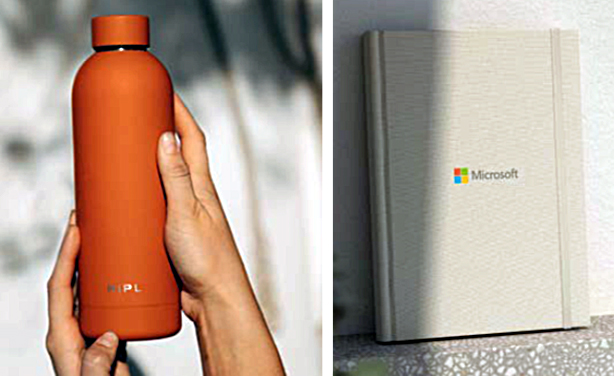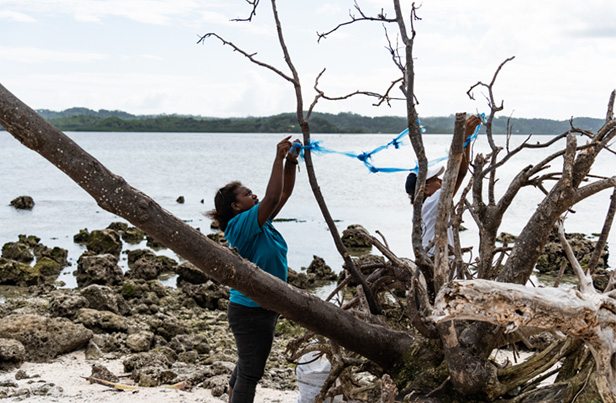Sustainability November 30, 2023
How One Sustainable Supplier Is Creating a Positive Ripple Effect
RIPL Goods uses the profits from its reusable water bottles to fund plastic cleanup efforts along beaches – then uses that recycled plastic to create new products that also help protect the environment.
Leo Bellis-Jones has set a lofty goal with his company RIPL Goods (asi/82503).
“Our message is essentially to help brands change the world with the merch they buy,” says the ocean activist from London who now hails from Byron Bay, Australia. “People don’t just want products that are doing less damage than other products. They want products that have a net positive benefit.”
Bellis-Jones first got a taste of the positive impact commerce could have while working in advertising in the U.K. One of the projects he worked on was designed to benefit a charity for homeless youth. “We started a company selling cardboard boxes to people moving house, and all the profit went to help homeless people move off the street,” he says. “It’s a very rewarding business model but cardboard boxes weren’t really my passion.”
It was during a trip to Bali, Indonesia, where he witnessed firsthand the plastic pollution problem and the negative impact it was having on coastal communities, that he discovered his true passion: using merch and storytelling to start a positive ripple effect on people and planet.

RIPL Goods sells reusable water bottles and notebooks made from recycled materials – with profits going toward various impact projects to help people and planet.
RIPL sells stainless-steel, double-insulated water bottles with a tactile silicon matte finish, with the profit from each bottle sold used to fund a day of work in Bali; Kerala, India; or the Solomon Islands, collecting plastic from the beaches for recycling. “One garbage truck of plastic is discarded into our oceans every minute of every day. Many developing countries lack the infrastructure to deal with it,” RIPL’s marketing material notes. “We focus on employment because it helps lift people out of poverty, as well as preventing about 1,000 plastic bottles from reaching the ocean for every one day of collection.”

Sales of RIPL bottles go toward employing locals in coastal communities – paying them to clean up plastic from beaches and deliver it to recycling centers.
Sales of RIPL bottles have funded about 50 years’ worth of employment for locals in coastal communities, and the collection of about 20 million plastic bottles, Bellis-Jones says.
But the impact doesn’t stop there. Plastic collected from beaches thanks to RIPL bottle sales is upcycled into a linen-like synthetic fabric that becomes the cover for a line of recycled paper notebooks the supplier sells. The profit from those notebooks – as well as the organic cotton totes it sells – are used to protect rainforest land in Brazil. Each notebook or tote sold, Bellis-Jones says, helps preserve 1,000 square feet of rainforest.
RIPL partners with an organization that outbids logging and mining companies looking to buy farmers’ land in Brazil. After buying the land and preserving it as a nature reserve or wildlife corridor, the organization hands it over to local communities, training them to be custodians of the land, according to Bellis-Jones.
“It’s amazing how a single order from a brand and a distributor can have such a lasting impact,” Bellis-Jones adds.
RIPL is a relative newcomer to the promo industry, but so far Bellis-Jones says reception to his company has been positive, with more and more distributors understanding the importance of sustainability-focused storytelling as not just a value-add to a product, but as a value in and of itself.
Bellis-Jones says his company will work with distributors and their clients to help tell the story of RIPL Goods – for example, putting QR codes on packaging that leads to a custom landing page to share the specific impact metrics an order will have and profiling some of the plastic collectors who are gaining employment through the impact initiative.
“There are different ways to look at the plastic problem,” Bellis-Jones says. “There’s a very cold, metrics-driven approach, and of course, that’s important, but when I started really looking into this problem and immersing myself in the world, I’ve very quickly come to believe that the plastic problem isn’t just an environmental one, it’s a human one, and if we can approach it from a very human level, then we can have a greater, lasting impact.”

Promo for the Planet is your destination for the latest news, biggest trends and best ideas to help build a more sustainable and socially-responsible industry.
